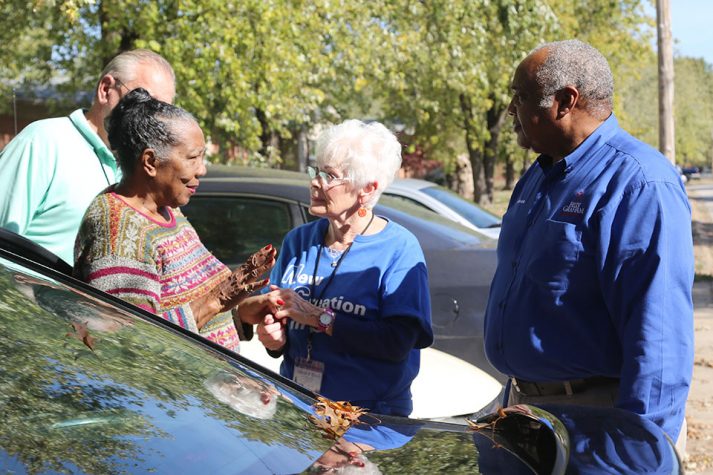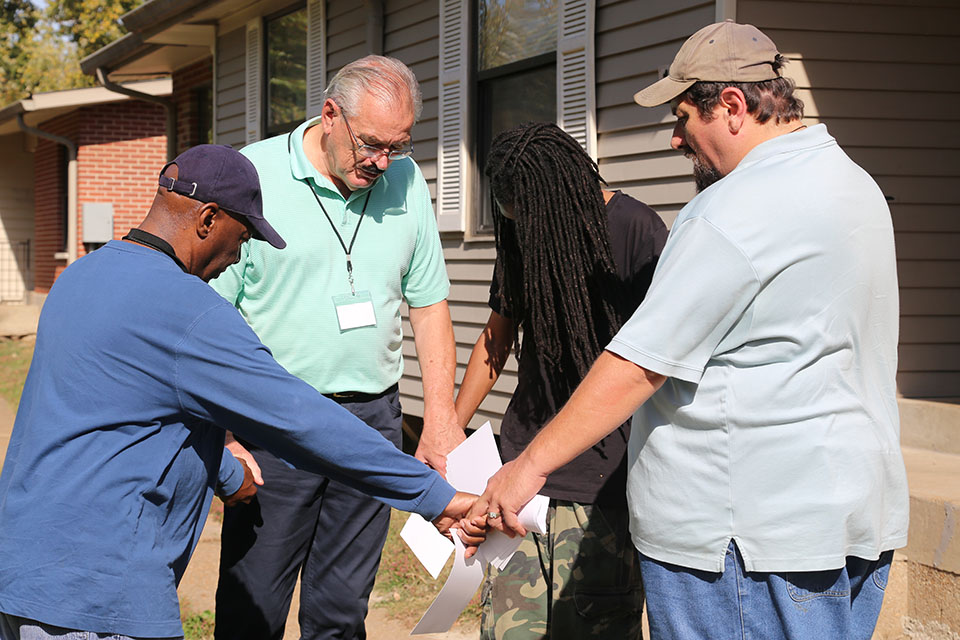
Grief and regret spilled out of Desuirea Harris’ eyes. She mopped up the tears with a tissue as she shared her memories of “Mike Mike,” her late teenage grandson, Michael Brown Jr.
His name alone conjures up memories from 2014 when his fatal shooting prompted an already quietly divided Ferguson, Missouri, to boil over. Peaceful protests were overshadowed by violent civil unrest. The once unknown city became a household name as media zeroed in on the hostility and destruction.
This month marks the third year since Brown died, and there has been some evidence of bridging gaps—for instance, a civilian review board now has input into police hiring decisions. But other aspects don’t seem to have changed much. Old narratives die hard. Chasms still exist, and the police force, while rebuilding, is still understaffed.
But quietly, one group has been making a difference, Harris said. Led by Rev. José Aguayo, a Billy Graham Rapid Response Team chaplain, the Adopt-A-Block group is pouring the love of Jesus Christ on the community one Saturday at a time. In addition to weekly neighborhood visits, the group also has frequent events, like community barbecues. On Aug. 9 and 12, volunteers will staff a prayer tent for the anniversary of Brown’s death.
“They were the only people that have reached out to me in the whole 26 months that my grandson has been gone,” Harris said during an interview last October. “No one have came but Pastor José and them. They are the only ones that have kept coming. They come and they pray with me every week, and they keep me a little bit afloat.”
At the very time Harris was sharing her story, Aguayo was training more Adopt-A-Block volunteers at the Ferguson Community Center. The group, comprised of local church attendees and residents, continues to grow, and every Saturday, volunteers visit with assigned parts of the city. Their mission is simply to love their neighbors. That might mean fielding resources or it might just mean listening and praying with someone in need. A new aspect of the Adopt-A-Block outreach involves helping seniors, single parents, veterans and disabled residents to help with home repairs.
“Things are moving,” Aguayo said. “People are getting jobs. People are getting prayer. It’s moving along.”
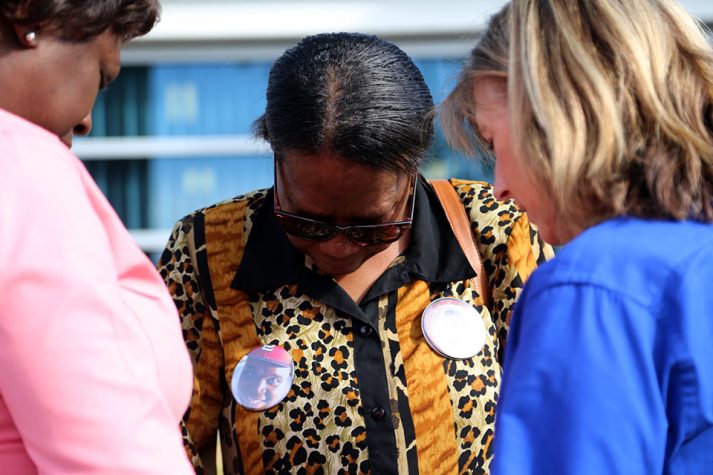
‘It Only Takes a Few People’
DeAndre Thomas shook hands with the three Adopt-A-Block volunteers in front of his Northwinds Apartment home. This apartment complex is where Michael Brown Jr. lived; it sits adjacent to Canfield-Green Apartments, a now-transient area where the teenager died.
On this fall Saturday afternoon, Thomas was grateful for the chance to join the Adopt-A-Block volunteers in prayer.
“Y’all coming up and giving a word like that, and walking around, not afraid to talk to people, to reach out to them—that’s great,” Thomas said afterward. “Just imagine if we had people like y’all doing this in other different communities at the same time. It only takes a few people to reach out. A lot of people don’t think that matters, but it really do because you never know what somebody’s going through.
“That made my day right there.”
Just around the corner, a woman repeatedly asked Vivian, another Adopt-A-Block volunteer visiting the Northwinds neighborhood that fall day, “You’ll call, right?” Vivian promised she would.
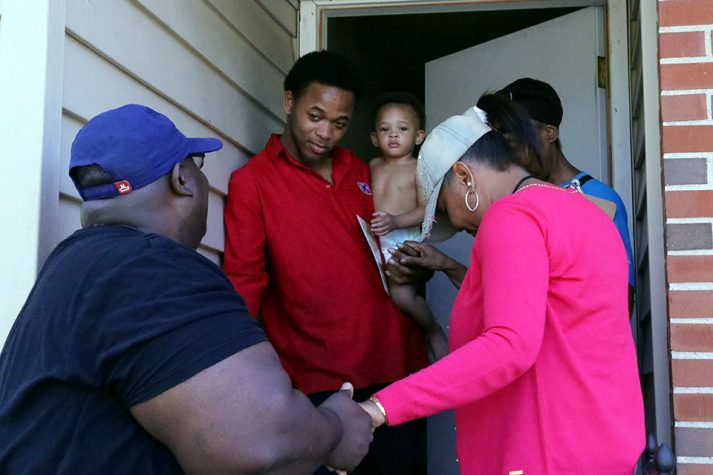
These connections, some of which started with the birth of the Ferguson program in spring 2015, continue to deepen. In some cases, those on the receiving end of the visits start walking the neighborhoods themselves. Aguayo shared how a previously depressed woman within an Adopt-A-Block neighborhood just attended training.
“Now she’s a part of Adopt-A-Block,” Aguayo said. “She’s having prayer meetings in her house.”
Marion McNeil, a minister at Refuge of Restoration, recently attended a training and walked the community that same morning. She was struck by one resident’s response. This woman was doing her best to stay awake so she wouldn’t miss her weekly Adopt-A-Block visit because she had a praise report to share. Her niece—who had a tumor the group had been faithfully praying about—was doing well and coming home from the hospital.
“It was inspiring,” McNeil said. “Very inspirational I would say, because the people look for you to come back every week.
“If it really snowballs, you wouldn’t have people in such a great need as you see today,” McNeil added. “You’ve got a lot of people that are hurting within their homes but they’re afraid to share with anyone because the whole thing in a nutshell is, ‘Who cares?’ That’s the attitude. But they need to know that somebody does care.”
Down the street that day, Mary was just returning to her home after a brief stay at the hospital for pneumonia. The senior Northwinds resident brightened when she saw the Adopt-A-Block volunteers that included Rapid Response Team chaplains Aguayo and Suzanne Galvin. This group has become part of Mary’s world now, and she looks forward to seeing them.
“I think it’s a blessing, and I never lived on a block where you had someone to come by and pray for you,” Mary said. “I think prayer always helps.”
Nearby, a young group of children walked up the street. No more than 7 years old, the trio—two boys and a girl—stopped to talk with Mary. Galvin knelt to talk briefly with them. The conversation ended with Galvin encouraging them to be safe.
“Oh we’re safe,” the girl replied matter-of-factly. “My friend has a knife.”
The words, spoken with a tone of innocence, are a jolt back to reality—back to a place where the community and law enforcement officials are still learning how to coexist.
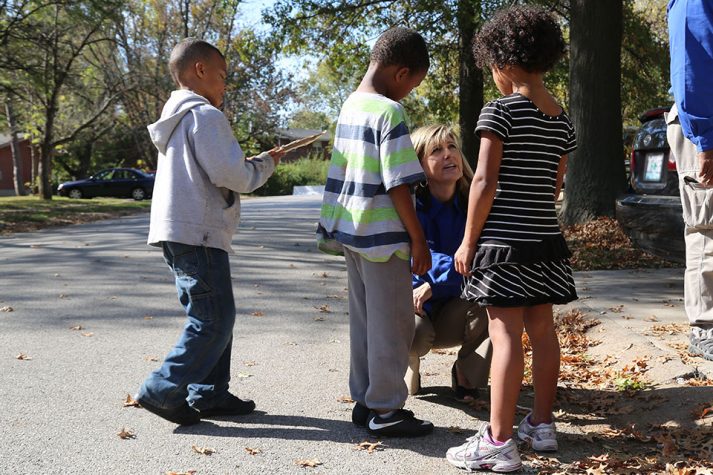
‘I Can’t Do It Alone’
Ferguson officer Greg Casem understands the challenges, particularly in the wake of such a thorough investigation by the Department of Justice. But a former foster kid himself, he has a heart for family; a passion for seeing youth grow up safe and supported.
“I can’t do it alone,” Casem told the group of Adopt-A-Block trainees, encouraging them that they’re making a difference.
Later, Casem sat in the lobby of the Ferguson Community Center sharing his heart. He has spent the better part of his 28 years in Ferguson meeting parents and engaging with residents. Gregarious in spirit and commanding in presence, he recalls how he would basically plant himself in a local QuikTrip, sip the Pepsi he oughta give up and just chat with people who came in. These small conversations, fueled by his genuine interest in people, seemed to gain him credibility with the community. All because he cared.
Aug. 9, 2014, changed all that.
In the aftermath, those once comfortable with Casem saw the badge and not the man. That hurt. During the violent unrest, he watched, troubled, as the community he cared for threw bottles and even spat on him as he stood clad in riot gear on the blue line. But Casem also watched something else. He said he saw the Billy Graham Rapid Response Team, which officially deployed to the area twice in 2014 and 2015, help instill a “hardcore, pure love” in the community. The Adopt-A-Block program, Casem added, followed in that wake and continues to make a difference.
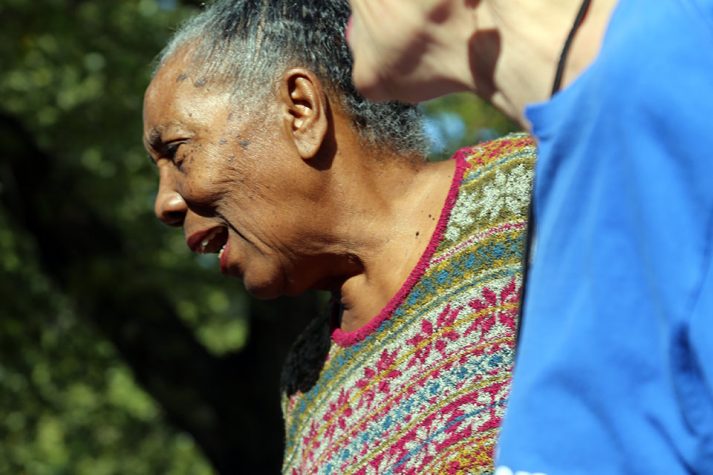
“There’s a lot of people who don’t realize how much help they need until this group comes into the neighborhood, first in prayer and first in listening,” Casem said. “I think that’s what a lot of people are missing is someone to listen to them. These people who go on the Adopt-A-Block, they listen, and I think that helps with a lot of people that are struggling.”
‘He Was My Best Friend’
The tears still falling from her eyes, Michael Brown’s grandmother won’t talk about the day her grandson died or the decision not to indict officer Darren Wilson. But she does almost immediately acknowledge the violent aftermath was a shame.
“I hate that it happened after that happened to him. That wasn’t his intention,” Harris said. “All the rioting, my grandson was peaceful.
“It should have been for a better, not for this.”
Better is what she was looking for when she first moved her family to Ferguson. Originally, they lived in St. Louis, but after spending one evening sheltered in a closet during a neighborhood shootout, she wanted something more peaceful.
Ferguson seemed to be an ideal spot, and initially she enjoyed being there. She helped raise Mike Mike so his young mother, her daughter, could work. The two had a blast, and once Harris surprised her grandson with “one of those Taco Bell dogs” he adored. “They were double trouble,” she said, a smile breaking through.
Harris was involved, to the point where she was walking her grandson to the bus and was there waiting on him when he got home. Everybody, even Mike Mike as he aged, seemed to take it in stride.
“On the first day of school, I met the teachers. I made myself known to the bus driver. … I’m at the PTAs. I’m at the plays. I’m at all that,” Harris said.
Harris is grateful for the support she receives from Adopt-A-Block. She admits every day is hard, and sometimes she envisions God carrying her when the path is too difficult to walk alone.
“As far as my grandkids, all of them is a gift from God, but he was my first and my strongest,” she said, dabbing her eyes. “He was my best friend. It wasn’t nothing he didn’t come and tell me. Nothing.
“He was just so full of life.”
